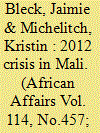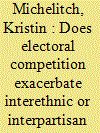| Srl | Item |
| 1 |
ID:
141480


|
|
|
|
|
| Summary/Abstract |
In 2012 Mali faced a crisis disrupting nearly twenty years of democratization – a coup and rebel insurgency. This article investigates policy priorities amongst rural Malians living on the border of state and rebel-controlled territory during the crisis. While academic and policy-making communities have focused largely on Mali's recent and sudden regime and territorial breakdown, the villagers defined the crisis in terms of their unmet needs for public services and infrastructure amidst high food and water insecurity. Concern for the sudden ‘juridical state’ breakdown – the collapse of the democratic regime – was trumped by the focus on long-term ‘empirical state’ breakdown. Using recent Afrobarometer data on diverse dimensions of empirical statehood, we show that the problem of rural neglect emphasized by seminal scholars is persistent not only across Mali, but also across many African countries. The tendency of academics and policy makers to focus on the immediate or more volatile political problems of the coup and rebel insurgency facing the Malian state, while important, risks understating and underestimating the power of slow-moving crises of daily life that are more important to rural citizens.
|
|
|
|
|
|
|
|
|
|
|
|
|
|
|
|
| 2 |
ID:
141642


|
|
|
|
|
| Summary/Abstract |
Does political competition exacerbate economic discrimination between citizens on ethnic or partisan cleavages? Individuals often discriminate on group lines in ordinary economic activities, especially in low-income settings. Political competition, and thus mobilization of partisan and ethnic groups, waxes and wanes over the electoral cycle. This study therefore investigates discrimination over the electoral cycle in a commonplace yet consequential economic activity: market price bargaining. By conducting field experiments on taxi fare bargaining at three points in time around Ghana’s 2008 election, the research reveals that drivers accept lower prices from coethnics regardless of temporal proximity to the election. However, only at election time, drivers accept lower prices from copartisans and demand higher prices from noncopartisans. In sum, political competition affects commonplace economic transactions between citizens on the partisan cleavage. This study is the first to show evidence of interpartisan discrimination in everyday behavior and expands our knowledge of electoral cycle effects.
|
|
|
|
|
|
|
|
|
|
|
|
|
|
|
|
| 3 |
ID:
159500


|
|
|
|
|
| Summary/Abstract |
Politicians shirk when their performance is obscure to constituents. We theorize that when politician performance information is disseminated early in the electoral term, politicians will subsequently improve their performance in anticipation of changes in citizens’ evaluative criteria and possible challenger entry in the next election. However, politicians may only respond in constituencies where opposition has previously mounted. We test these predictions in partnership with a Ugandan civil society organization in a multiyear field experiment conducted in 20 district governments between the 2011 and 2016 elections. While the organization published yearly job duty performance scorecards for all incumbents, it disseminated the scorecards to constituents for randomly selected politicians. These dissemination efforts induced politicians to improve performance across a range of measures, but only in competitive constituencies. Service delivery was unaffected. We conclude that, conditional on electoral pressure, transparency can improve politicians’ performance between elections but not outcomes outside of their control.
|
|
|
|
|
|
|
|
|
|
|
|
|
|
|
|
| 4 |
ID:
187706


|
|
|